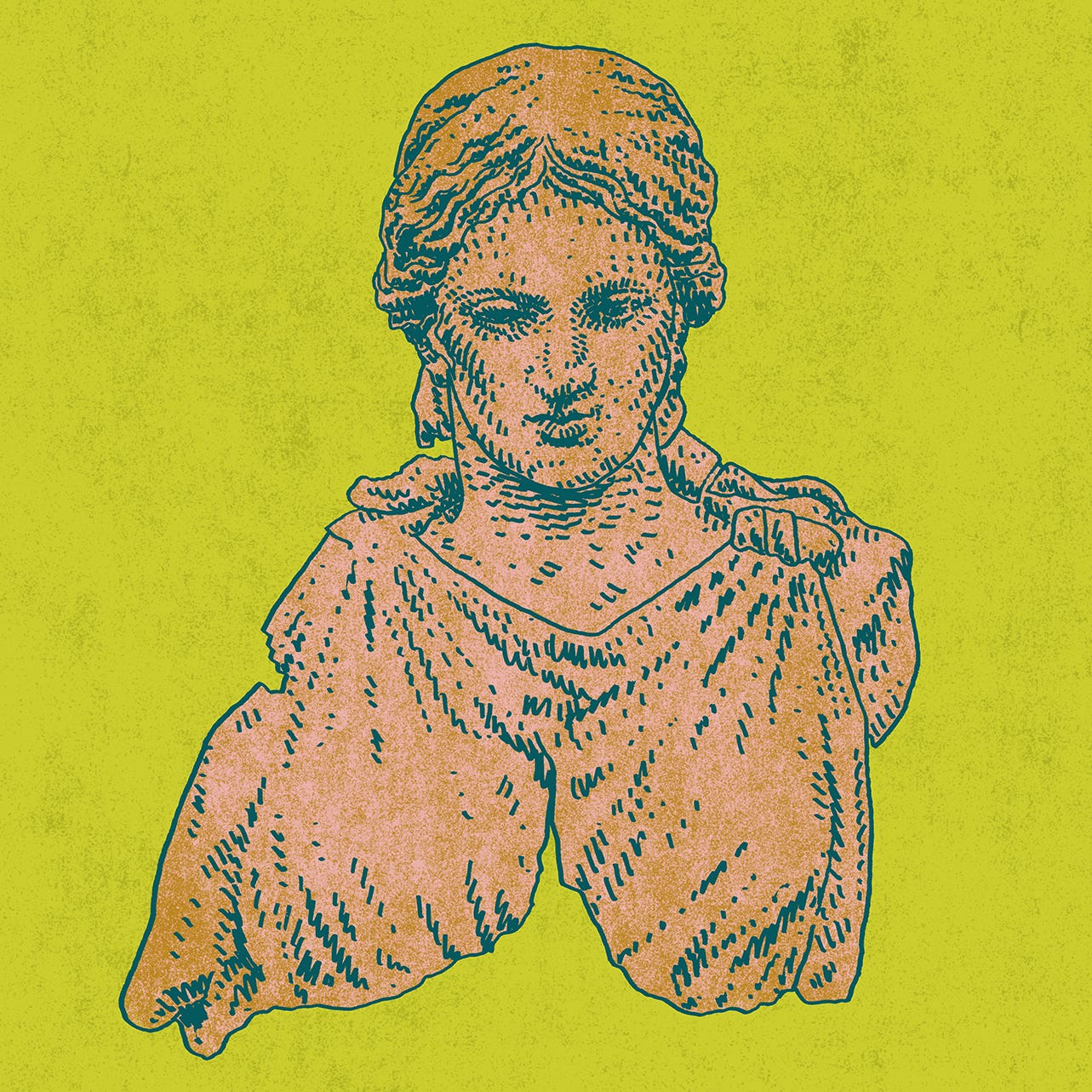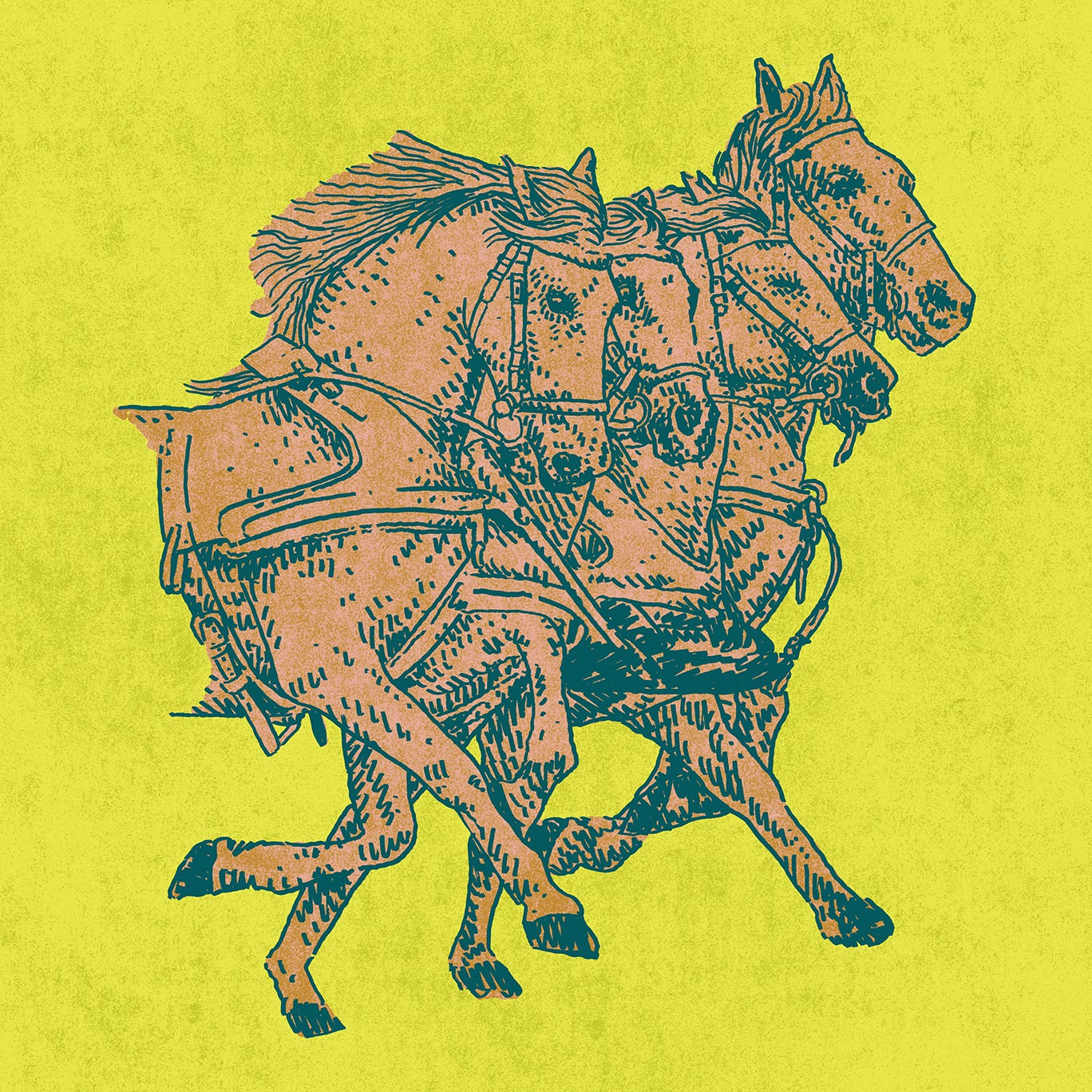The Chariot Princess of Sparta
in 396 BCE, Cynisca became the first woman to win in an Olympiad
Usually when I write these Sports Stories posts -- when I write anything really -- I am intermittently crippled by the magnitude of my own ignorance. It’s something I can get around and get over. You have to get over it, if you’re going to write anything at all.
But whether the subject is Jackie Tonawanda or Togo the Alaskan Malamute, or even the events that made up my book, I always run into this place where I stop writing and think: I really wish I knew more. I wish I was there to see it, hear it, and smell it. I wish I had more context. The act of studying and writing about history, it turns out, is as much about what you don’t know as what you do know.
So it seems like I should tell you that I don’t know much about Ancient Greece. And it also seems fair to say that the historians and archeologists and classicists who study it don’t know that much either. The knowledge that we do have is the result of the remarkable records kept by a society that was around for a long, long time; and more than that it’s the result of incredible work by scholars who have preserved, uncovered, and studied those records in the thousands of years since.

Still, this week’s subject lived about 2,400 years ago. A great deal about her is lost. She was born and raised in the Ancient Greek city-state of Sparta. We know about Sparta, or at least we have an idea about it. It was a serious place that bred tough warriors and didn’t care much about luxury or frivolous things. Spartan society had its quirks. They were less welcoming of foreigners than other city-states like Athens, but women in Sparta were actually treated relatively well. For example, they could own property.
In her time, Cynisca was one of the women who benefitted from Sparta’s relatively enlightened gender politics. She was the daughter of a king, and her two brothers also became kings. Not too much about her personal life or her upbringing have survived. But some scholars think Cynisca, which roughly translates to Little Hound, was in fact a nickname.
Cynisca was born around 440 BCE. and lived during one of the wildest and most action-packed eras of Ancient Greece. It was like if 2020 was a century instead of a year. She was around at the same time as Socrates and Plato. She was around for the decades-long Peloponnesian War between Athens and Sparta. She was also around for the Ancient Olympiad.
One of the few things that is well known about Cynisca is that she was incredible with horses. She had a facility for training them, for handling them, for riding them. Pausanius, a Greek historian writing 500 years later, described Cynisca as “exceedingly ambitious.”

Perhaps it was her ambition that led Cynisca to the Olympic Games in 396 BCE She was already into middle age by then. Or perhaps it was that the timing finally worked out. Sparta had been banned from participating in the Games during at least certain portions of the Peloponnesian War. But by 396 the war was over and a Spartan delegation made its way to Olympia.
The Ancient Games were not unlike the contemporary Olympics. There were thousands of people from everywhere. There was excitement. There was squabbling about every little thing. In Ancient Greece, the games were meant to honor the god Zeus. (Insert joke about how the only god the modern Olympics honor is money). Despite the famous Olympic Truce, the competition itself often took on the nature of a quasi-battlefield. City-states fought proxy wars through their chariot racers and wrestlers. Sports and politics have always been connected..
As a woman, Cynisca was not allowed to actually compete in the games. Instead she trained horses for the 4-horse chariot race and sent them along with a man to drive them. In modern horse racing terms, she was more Bob Baffert than Victor Espinoza. But when her team won the race in 396, the winner’s wreath came back to Sparta and to her. Cynisca quickly became a hero.
Cynisca was the first woman to win in the Olympiad, and the monuments constructed in her honor in Sparta and in Olympia where the games were held were the first monuments to a woman for Olympic victory. Scholars have written that she cleared the way for more women to compete in the years to come.
But at least one contemporary of Cynisca wrote that her victory was the result of a devious plot by her brother, King Agesilaus. Agesilaus apparently hated chariot racing. His critiques will also likely sound familiar to modern sports fans: the horses did all the work, it was all about money anyway. It was not honorable, in other words.
The theory goes that Agesilaus knew that Cynisca was a genius with horses, and that she had invested a great fortune into them. He supposedly coaxed her to participate with the idea that her inevitable victory would certainly discredit the entire sport -- after all, if a woman could win, was it really a sport?
The first half of Agesilaus’s plan worked. Cynisca did win. But nobody stopped loving chariot racing. Men continued to breed and train horses to compete. The only difference was that now Cynisca was a hero in Sparta. And at the following Olympics, in 392, she once again emerged victorious. Instead of discrediting chariot racing, Cynisca elevated women in Sparta.

There’s a lot we don’t know about Cynisca. But we do know this. Inscribed on one of the statues erected in her honor at Olympia was the following verse:
My ancestors and brothers were kings of Sparta
I, Cynisca, victorious with a chariot of swift-footed horses,
Erected this statue. I declare that I am the only woman
In all of Greece to have won this crown.
Related Reading
Sarah B. Pomeroy’s Spartan Women, Mark Golden’s Greek Sport and Social Status, and Gerald P. Schaus’s Onward to the Olympics were all valuable in uncovering the life of Cynisca and understanding the place and time in which she lived.
That said, if you really want to go deep on Cynisca, I recommend this article: “The Only Woman in All of Greece” by Donald J. Kyle from the Journal of Sport History. It’s free to read if you register for an account on JSTOR -- warning though, Kyle spells Cynisca’s name Kyniska with a K.
There are also those few remaining ancient accounts that mention Cynisca: There was Pausanias, who wrote about 500 years after her Olympic feats. There was Plutarch, a century before Pausaias, who wrote a biography of Cynisca’s brother Agesilaus. Finally, there was Xenephon, the friend of Agesilaus who wrote a fawning history of the king’s life. And I mean *really* fawning.
I will leave you with Xenophon’s opening lines about Agesilaus. We should all be so lucky as to have a friend like Xenophon:
I know how difficult it is to write an appreciation of Agesilaus that shall be worthy of his virtue and glory. Nevertheless the attempt must be made. For it would not be seemly that so good a man, just because of his perfection, should receive no tributes of praise, however inadequate.


